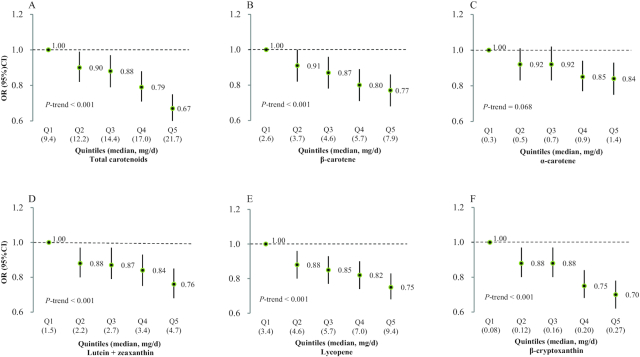FIGURE 1.
ORs for poor subjective cognitive function assessed in 2012–2014, across increasing quintiles of total and individual carotenoid intakes in 1984–2006 in 49,493 women in the Nurses’ Health Study. (A) Total carotenoid intake, (B) β-carotene intake, (C) α-carotene, (D) lutein + zeaxanthin, (E) lycopene, (F) β-cryptoxanthin. The multivariable model was adjusted for age, race (white, other), education (registered nurse, bachelor's degree, graduate degree), husband education (high school degree or less, college degree, or graduate school), parental history of dementia (yes/no), smoking (never, ≤4, 5–24, >24 pack-years), cancer (yes/no), hypertension diagnosis (yes/no), depression, elevated cholesterol (yes/no), physical activity level (metabolic equivalent of tasks, h/wk; quintiles) and BMI (<23, 23-24.9, 25-29.9, ≥30 kg/m2) from 1984–2006, cardiovascular disease (yes/no), multivitamin use (yes/no), alcohol intake, total calorie intake, number of dietary assessments, postmenopausal status and hormone replacement therapy use, parity (nulliparous, 1, ≥2), and intakes of vitamins C, D, and E, anthocyanidins, trans-fat, saturated fat, and long-chain n–3 fatty acids. The numbers of participants across the increasing quintiles of total and individual carotenoids were ∼9898, 9899, 9899, 9899, and 9898, respectively.

